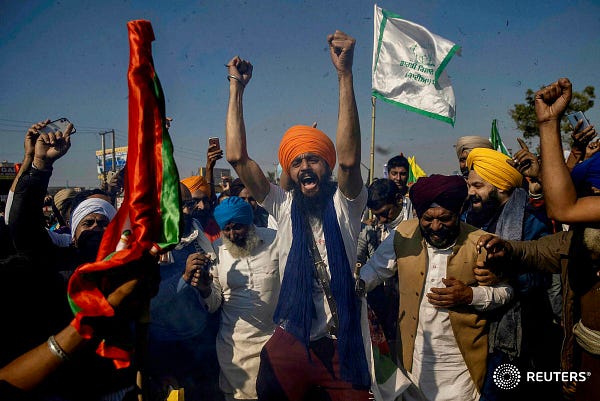Covid vaccine supply chain, farmer fury in India, South Korea's ultimate exam and Warner Bros' bold streaming move
30 November - 6 December 2020
Welcome to December!
FROM LAB TO JAB
The UK’s approval of Pfizer/BioNTech’s Covid-19 vaccine is being hailed as a scientific victory. The first batch of doses is en route to the country, with an immunisation drive expected to kick off in the coming days.
However, despite the cautious optimism, transitioning from clinical trials to global campaign is an enormous task. Mass producing and delivering coronavirus jabs to billions of people requires seamless integration between every level of the supply chain.
Consider the containers, for example. Becton, Dickinson and Company, the world’s largest supplier of injection devices, is rapidly scaling up its operations to make 800 million syringe and needle sets to support Covid-19 vaccination. When placed end-to-end, these kits would circle the Earth twice over. Elsewhere in India, Hindustan Syringes says it's increasing output from 700 million units per year to one billion in 2021.
Then there's the issue of the vials. Some in the sector are worried about whether glass manufacturers can meet higher demand amid sand shortages. Furthermore, since Pfizer and Moderna's doses need to be stored at -70°C and -20°C respectively, the material used has to withstand sub-zero temperatures.
Once the packaging hurdles are out of the way, various logistics firms will have to establish sophisticated "cold chain" networks - involving thermal sensors, dry ice boxes, cargo planes etc. - to distribute the jabs to physicians and pharmacies across the planet. In addition to human error and natural disasters, these systems are also vulnerable to hack attacks and cyber espionage, according to IBM.
On top of those daunting challenges, industrial and medical teams must do all of the above without compromising supplies of other essential drugs.
FARMERS' FURY
Tens of thousands of Indian farmers are protesting in New Delhi, blocking roads and highways around the capital city.
The demonstrators have been occupying the streets for over a week now, and they're threatening to stay for months if the government doesn't repeal three agriculture laws passed by parliament in September.


The legislation gives farmers the freedom to sell crops to independent buyers outside of state-sanctioned markets. Prime Minister Modi says the liberalisation will allow more autonomy while increasing efficiency in the country's vast agricultural sector.
However, scores of farmers aren't convinced. They're concerned the government will drop minimum price guarantees for essential crops, which would hurt their income and put them at the mercy of large corporations. Debt levels and suicide rates are already high among India's farming community, especially smaller land owners.
Most economists back Modi's efforts to modernise and transform India. If the agriculture reforms succeed, private investment will flow in and producers will benefit. But analysts agree that the government may have been too hasty and missed a vital opportunity to properly consult with farming unions.
THE ULTIMATE TEST
Anxious teenagers, praying parents, shuttered shops, police patrols and grounded planes. These are usual sights across South Korea on every third Thursday of November, when hundreds of thousands of students take the hyper-competitive university entrance exam known as "Suneung".
This year, Suneung was delayed to 3 December due to the pandemic. The eight-hour marathon of tests is normally a nerve-racking experience but the coronavirus further complicated the annual event. The education authorities had to thoroughly disinfect desks, maintain social distancing, and install temperature monitors and plastic dividers. Arrangements were also made for the dozens of students recovering from Covid-19 in hospital as well as those in self-isolation.
Suneung determines college admissions, job prospects and earning potential as recruiters at the country's leading conglomerates, such as Samsung and Hyundai, seek out the crème de la crème.
The official results will come out on 23 December.
RIP MOVIE THEATRES?
Is Warner Bros. putting another nail in the coffin of the cinema business?
Hollywood is reeling from the shock announcement that the studio will release its entire 2021 slate simultaneously in theatres and on its streaming platform HBO Max. This means blockbusters like Dune, The Matrix 4, The Suicide Squad and Mortal Kombat will share the same fate as Wonder Woman 1984.
At the moment, HBO Max is only available in the US, so exhibitors elsewhere won't be directly impacted by this hybrid model. But Warner's move raises serious questions about piracy risks and the future of the entertainment industry.
Cinemagoing was declining in many territories before the pandemic hit, and then it came to a halt during the lockdowns. For the studios, the financial burden of postponing releases is significant - No Time to Die, the latest James Bond feature, is reportedly costing MGM approx. US$1 million per month in interest.
Although streaming fees pale in comparison to theatre ticket prices, it seems Warner is willing to accept those losses in order to boost HBO Max's subscription base in the long-run. The studio's extensive catalogue makes it a formidable rival to Netflix, Disney+ and Amazon Prime.
Still, pursuing this strategy is incredibly messy. Warner's production partners and distributors are furious, plus actors are demanding clarity on box office-related pay clauses in their contracts. Watch this space for more on the fallout.





